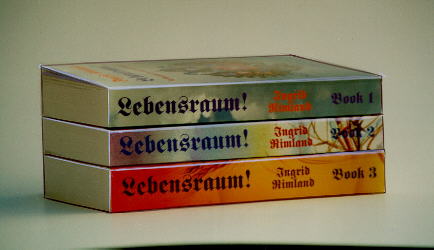An unrecognized literary masterpiece!"

"
An unrecognized literary masterpiece!"
Lebensraum! - An Instauration Review
"In the spirit of these spiritless times, any author of a three-volume novel upholding such faded virtues as loyalty and honor would be considered "out of it." If the same novelist wove brief strands of tribute to Hitler in his or her pages, he or she would be deemed mad, a racist, an anti-Semite and a threat to the social order. Miraculously, such a writer and such a work exists. The author's name is Ingrid Rimland, and her work "Lebensraum!" is suffused with brilliant flashes of literary talent, albeit no "respectable" publisher would touch it, and no "respectable" critic would review it.
Tolstoyan in its sweep, "Lebensraum!" focuses on the trials and tribulations of a congregation of Christian fundamentalists called Mennonites. One group left Germany and settled in Ukraine at the behest of Catherine the Great, who wanted to capitalize on the Mennonites' agrarian expertise. The other group ended up in Kansas in the latter half of the 19th century. In each case the Mennonites transformed the land into farming utopias, coloring the fertile acres with amber waves of grain. Both communities, though separated by thousands of miles, were known for feeding a good part of the world. Rimland's description of farm life in both Ukraine and Kansas equals the best of the "Breadbasket" school of writing, whether in the New World or in the Old.
But paradises, like certain radioactive elements, have a short half-life. The Communist takeover of Ukraine after WWI and the brutal dispossession of the Kulaks, the prosperous Russian farmers, along with the Mennonites, was sheer horror. Those who resisted having their property and lands seized by the Reds were tortured, murdered or sent off to Siberia. The upshot was the fearful Ukrainian Holocaust. Rimland, who gives the official Jewish Holocaust short shrift, categorizes the Ukrainian as authentic and responsible for millions of deaths.
In describing the suffering of the Mennonites in Ukraine in a manner and style resembling Dante's Inferno, Rimland's prose occasionally rises to poetic heights. What people anywhere on earth, anywhere in history, have been put through such an ordeal! Rimland's writing is so powerful that the reader almost suffers as much as the victims. On the other hand, the Mennonites of Kansas, although they went through some bad times in the Great Depression and lost a considerable number of men in two world wars, practically had a joyride compared to the fate of their Ukrainian cousins.
Rimland's characters live and breathe. The storyline is uncluttered and right to the point. The reader not only learns what is going in, he feels what is going on. The trials and tribulations encountered on the trek of the displaced Germans, including the Mennonites, through Eastern Europe in WWII amounts to an excruciating Via Dolorosa, a gruesome anabasis. Soviet snipers, starvation and disease assured the lack of even the most elementary human necessities. Still the trekkers, with the sick in horse-drawn wagons, struggled on to reach a country as dangerous as the one they left.
In the last days of Berlin, the city becomes a huge fireball. Dodging her way through and around bombs, artillery shells and machine-gun fire was Erika, a 13-year-old girl wearing the uniform of a Hitler maiden and one of "Lebensraum!"s most sympathetic characters. At her defining moment, she approached a mound of rubble under which lay the body of her best friend. She wished her well and gave the Hitler salute, still convinced that, in the words of A. H. Clough, "Tis better to have fought and lost than never to have fought at all." Immediately afterwards she succumbed to days and nights of endless rapes. An American Negro, while on top of Erika, was shot dead by one of the few remaining Wehrmacht soldiers still alive and still in possession of a few bullets.
There are as many characters in Rimland's work as there are in "War and Peace", and they are drawn just as faithfully. Mennonites everywhere are united by race and religion, but divided by culture. In general, both the American and Ukrainian communities kept up their high moral standards. In the political context Americans picked up some democratic ideology. The Old World Ukrainians remained more tolerant of authority.
As for Rimland herself, as a very young girl she lived through many of the events she describes. Somehow or other she and her family got out of Germany at war's end and traveled to a small Mennonite colony in Paraguay, then to Canada, then to Kansas to be with her American cousins, finally to California where she won an award for an earlier novel, "The Wanderers", (Bantam Books, 1978) She now puts out a newsletter and what she calls ZGrams on the Internet.
It's hard to predict the fate of "Lebensraum!", a trilogy that deflates and defies all current literary themes. The three volumes portray a Führer with a human face and put the blame on Jewry for much of what has gone wrong in the world. Altogether it is a literary tour de force. The liberal-minority Jewish crowd, if they ever hear of her writing, will assign Rimland and all her works to the Devil.
In the end, if good writing triumphs over bad, if genius conquers all obstacles, "Lebensraum!", glowing with apt metaphors in a stultifying age, will become a literary icon."
=====
(Instauration, September 1998)
To order "Lebensraum (set)" ... and other products, print out an order blank!
Back to Lebensraum Index